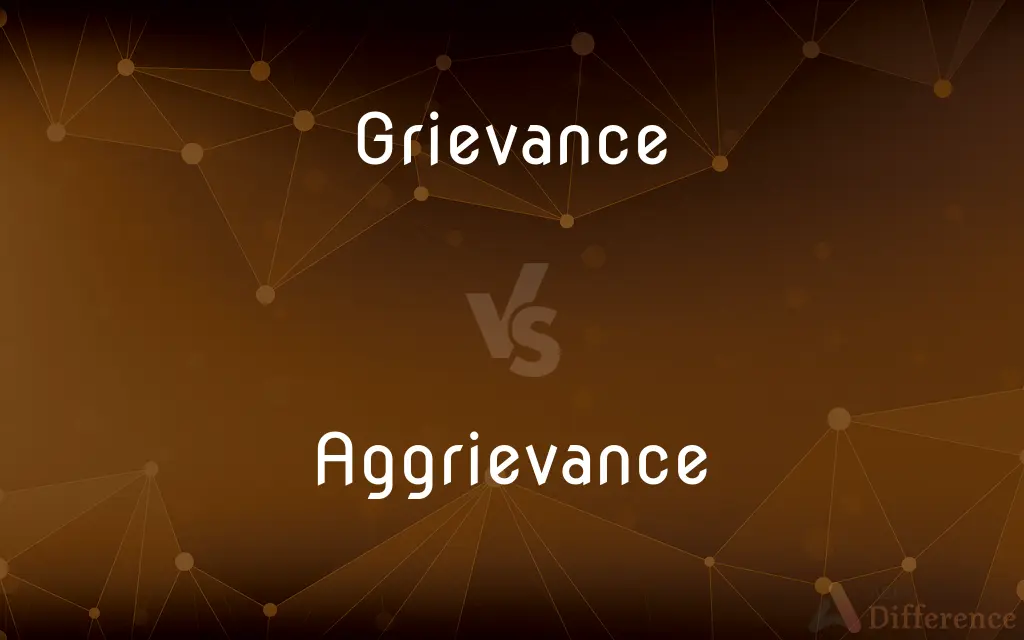Grievance vs. Aggrievance — What's the Difference?
By Fiza Rafique & Maham Liaqat — Updated on March 27, 2024
Grievance involves a complaint due to unfair treatment, while aggrievance isn't a standard term in American English.

Difference Between Grievance and Aggrievance
Table of Contents
ADVERTISEMENT
Key Differences
A grievance is a formal complaint or expression of dissatisfaction, often resulting from what is perceived as unfair treatment. This term is commonly used in workplace, legal, and social contexts, where individuals or groups may file grievances to address issues ranging from labor disputes to violations of rights. Whereas aggrievance is not recognized as a conventional term in American English. It appears to be a misspelling or a confusion with "aggravance" or "aggravation," which refers to annoyance or exacerbation of a situation.
Grievances are typically articulated through established procedures within organizations, legal systems, or societal structures, aiming to resolve conflicts, rectify injustices, or address specific complaints. On the other hand, because aggrievance does not have a defined role in standard language, it lacks a formal process for expression or resolution. The concept of aggrievance, if intended to imply a state of being aggrieved more intensely, would still fall under the broader umbrella of grievances in contexts where clarification or differentiation is needed.
The documentation and resolution of a grievance often involve formal mechanisms, such as grievance committees, legal arbitration, or mediation processes, emphasizing the structured approach to dealing with complaints. Conversely, aggrievance, as a non-standard or conceptual term, would not have established mechanisms for documentation or resolution, underscoring its ambiguity and lack of procedural clarity.
In professional or legal discourse, the articulation of grievances is essential for maintaining fair practices, ethical standards, and the protection of rights. It serves as a cornerstone for dialogue, negotiation, and improvement in relationships between parties, such as employers and employees, or service providers and consumers. The hypothetical concept of aggrievance, lacking formal recognition, does not contribute to such discourse in a meaningful way.
The understanding and addressing of grievances play a critical role in conflict resolution, fostering a sense of justice, equity, and satisfaction among involved parties. It underscores the importance of acknowledging and rectifying complaints to prevent escalation and to promote harmony. The term aggrievance, being non-standard, does not carry the same weight or implication for action, highlighting the significance of clear and precise language in addressing issues of fairness and dissatisfaction.
ADVERTISEMENT
Comparison Chart
Definition
A formal complaint or dissatisfaction due to unfair treatment.
Not a recognized term in American English.
Context
Used in legal, workplace, and social contexts.
Lacks a standard context due to being non-standard.
Resolution
Involves formal procedures for addressing and resolving.
Does not have established mechanisms for resolution.
Documentation
Typically documented through formal processes.
Lacks a formal process for documentation.
Purpose
Aims to rectify injustices or unfair practices.
Conceptual, lacking a clear purpose or application.
Compare with Definitions
Grievance
A grievance (from Latin gravis 'heavy') is a wrong or hardship suffered, real or supposed, which forms legitimate grounds of complaint. In the past, the word meant the infliction or cause of hardship.
Aggrievance
Oppression; hardship; grievance.
Grievance
An actual or supposed circumstance regarded as just cause for complaint.
Aggrievance
Oppression; hardship; injury; grievance.
Grievance
A complaint or protestation based on such a circumstance
The warden addressed the inmates' grievances.
Grievance
Indignation or resentment stemming from a feeling of having been wronged.
Grievance
The act of inflicting hardship or harm.
Grievance
The cause of hardship or harm.
Grievance
(countable) Something which causes grief.
Grievance
(countable) A wrong or hardship suffered, which is the grounds of a complaint.
Grievance
(uncountable) Feelings of being wronged; outrage.
Grievance
(countable) A complaint or annoyance.
Grievance
(countable) A formal complaint, especially in the context of a unionized workplace.
If you want the problem fixed, you'll have to file a grievance with the city.
Grievance
(uncountable) Violation of regulations or objectionable behavior.
Grievance
A cause of uneasiness and complaint; a wrong done and suffered; that which gives ground for remonstrance or resistance, as arising from injustice, tyranny, etc.; injury.
Grievance
Grieving; grief; affliction.
The . . . grievance of a mind unreasonably yoked.
Grievance
A resentment strong enough to justify retaliation;
Holding a grudge
Settling a score
Grievance
An allegation that something imposes an illegal obligation or denies some legal right or causes injustice
Grievance
A complaint about a (real or imaginary) wrong that causes resentment and is grounds for action
Share Your Discovery

Previous Comparison
Apprehend vs. Reprehend
Next Comparison
Milo vs. SorghumAuthor Spotlight
Written by
Fiza RafiqueFiza Rafique is a skilled content writer at AskDifference.com, where she meticulously refines and enhances written pieces. Drawing from her vast editorial expertise, Fiza ensures clarity, accuracy, and precision in every article. Passionate about language, she continually seeks to elevate the quality of content for readers worldwide.
Co-written by
Maham Liaqat













































